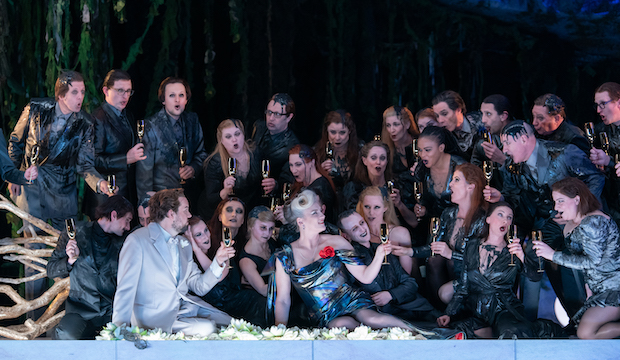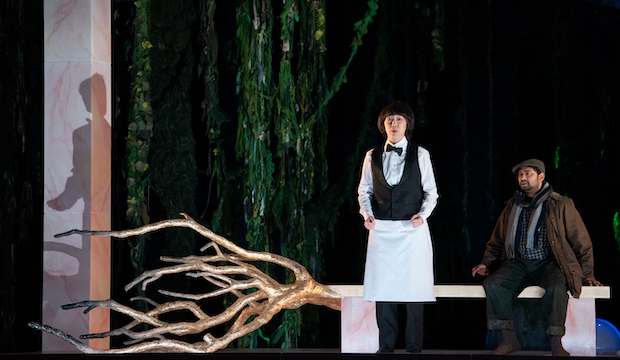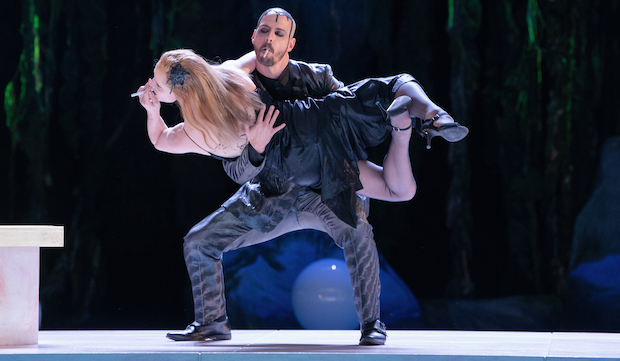Rusalka, Royal Opera House review ★★★★★
After a ravishing start, this often handsome production of Dvorak's opera loses momentum and falls short of its laudable ambitions
Asmik Grigorian in the title role of Dvorak's Rusalka. Photo: Camilla Greenwell
The curtain lifts on a ravishing image. The water spirit Rusalka, who falls Little Mermaid-like in love with a human, is floating high over the stage, the languid pulsations of her sea-green diaphanous robes telling us that she is in fact deep beneath the waves.
A young man swims down to her. They meet, separate and disappear, their languorous movements matching the warmth of the string sound that conductor Semyon Bychkov is drawing from the orchestra in the opera’s prelude. The Royal Opera’s new production of Dvořák’s Rusalka, created by co-directors Natalie Abrahami and choreographer Ann Yee, could not have got off to a better start.

A toast to the bride and groom. Photo: Camilla Greenwell
The programme promises us not only a feminist interpretation of the opera, but a sustainable production too. Chloe Lamford’s set for act one, richly washed by Paule Constable’s lighting design, is the most naturalistic – and beautiful – I’ve seen on the opera stage for many a long year. The forest glade is a wall of green, created by cascades of Spanish moss made, we are told, from recycled materials from old productions.
Rusalka’s father, Vodník (beautifully sung by the velvety baritone of Aleksei Isaev), appears out of the lake, sheathed in a costume which covers his arms, limiting their use, and immediately establishing him as an otherworldly creature. The costume designer, Annemarie Woods, provides a similar gown for Rusalka, which not only conceals her arms but has a 10-ft train, symbolically restricting her to slow, geisha-like movements. She longs for more, for freedom, for a soul, and tells her father, to his horror, that she wants to become human.

Hongni Wu (Kuchík) and Ross Ramgobin (Hajny). Photo: Camilla Greenwell
Rusalka is exquisitely sung by the Latvian soprano, Asmik Grigorian, her every phrase seemingly hanging in the air, sculpted with endless breath control. Every element of the production – from the design, to the movement, to the interpretation – was working beautifully together and, by the end of act one, I thought we were in for a 5-star evening.
Rusalka obtains her wish to become human by visiting Ježibaba (Sarah Connolly), described as a witch in the original libretto, but now listed in the programme as a wise, eternal spirit. Wise she may be but the co-directors do nothing to soften her cruelty. Her price for freeing Rusalka is to take her voice, which she does in a very literal piece of staging by ripping open Rusalka’s spinal column, leaving her with an enormous scar on her back.
In act two, we discover that Rusalka’s handsome Prince (played by the British tenor David Butt Philip, vibrant of voice and completely committed in his acting), has built a palace which defiles the purity of the forest glade. It's a sleek piece of modern architecture, a low pavilion, complete with roof, which stretches across the entire width of the stage, obscuring the view (and sound) of the singers from everyone sitting in the balconies. (Side note: when I am elected Master of the Universe, directors and designers will be contractually obliged to watch their productions from the Amphitheatre where half of the ROH’s audience sits.)

Costume design is by Annemarie Woods, choreography by Ann Yee. Photo: Camilla Greenwell
The pavilion is full of guests who have come for the Prince’s wedding to Rusalka and is usually the opportunity to stage a lavish ball scene. Instead, we get a lot of smokers crowded into the cramped pavilion with no room to dance and reduced to blowing smoke in Rusalka’s face. The guests include the Foreign Princess (Emma Bell), now recast in the programme as a Duchess, ‘the Prince’s political equal’. Despite being his equal, she is wearing a strapless gown, split to the thigh, and uses very unpolitical means to win the Prince away from Rusalka. Vodník reappears to take the defeated Rusalka back to the lake and Isaev’s devastating aria at finding his daughter broken-hearted is one of the musical high points of the evening.
In act three, the forest glade is despoiled with litter and the ruins of the pavilion – a good idea but feebly presented. The Prince returns to beg Rusalka’s forgiveness and die in her arms. Here Bychkov pours his Russian soul into the orchestral sound, determined to make the final love duet the climax of the evening. However, the staging has by then lost all the momentum and inspiration of the first act and, with several cast members on first night stretching uncomfortably for their top notes, the laudable ambitions of the creative team went unrealised.
Rusalka herself survives to the final curtain, where she is brilliantly lit – as befits the heroine of the opera: that in itself is a feminist statement in an art form where it’s almost obligatory for the soprano to die by the end, while the men who have destroyed her are left to mourn her passing.
Rusalka is sung in Czech, with English surtitles. Further performances are on 24, 27 Feb; 2, 5, 7 March. Click here to book
A young man swims down to her. They meet, separate and disappear, their languorous movements matching the warmth of the string sound that conductor Semyon Bychkov is drawing from the orchestra in the opera’s prelude. The Royal Opera’s new production of Dvořák’s Rusalka, created by co-directors Natalie Abrahami and choreographer Ann Yee, could not have got off to a better start.

A toast to the bride and groom. Photo: Camilla Greenwell
The programme promises us not only a feminist interpretation of the opera, but a sustainable production too. Chloe Lamford’s set for act one, richly washed by Paule Constable’s lighting design, is the most naturalistic – and beautiful – I’ve seen on the opera stage for many a long year. The forest glade is a wall of green, created by cascades of Spanish moss made, we are told, from recycled materials from old productions.
Rusalka’s father, Vodník (beautifully sung by the velvety baritone of Aleksei Isaev), appears out of the lake, sheathed in a costume which covers his arms, limiting their use, and immediately establishing him as an otherworldly creature. The costume designer, Annemarie Woods, provides a similar gown for Rusalka, which not only conceals her arms but has a 10-ft train, symbolically restricting her to slow, geisha-like movements. She longs for more, for freedom, for a soul, and tells her father, to his horror, that she wants to become human.

Hongni Wu (Kuchík) and Ross Ramgobin (Hajny). Photo: Camilla Greenwell
Rusalka is exquisitely sung by the Latvian soprano, Asmik Grigorian, her every phrase seemingly hanging in the air, sculpted with endless breath control. Every element of the production – from the design, to the movement, to the interpretation – was working beautifully together and, by the end of act one, I thought we were in for a 5-star evening.
Rusalka obtains her wish to become human by visiting Ježibaba (Sarah Connolly), described as a witch in the original libretto, but now listed in the programme as a wise, eternal spirit. Wise she may be but the co-directors do nothing to soften her cruelty. Her price for freeing Rusalka is to take her voice, which she does in a very literal piece of staging by ripping open Rusalka’s spinal column, leaving her with an enormous scar on her back.
In act two, we discover that Rusalka’s handsome Prince (played by the British tenor David Butt Philip, vibrant of voice and completely committed in his acting), has built a palace which defiles the purity of the forest glade. It's a sleek piece of modern architecture, a low pavilion, complete with roof, which stretches across the entire width of the stage, obscuring the view (and sound) of the singers from everyone sitting in the balconies. (Side note: when I am elected Master of the Universe, directors and designers will be contractually obliged to watch their productions from the Amphitheatre where half of the ROH’s audience sits.)

Costume design is by Annemarie Woods, choreography by Ann Yee. Photo: Camilla Greenwell
The pavilion is full of guests who have come for the Prince’s wedding to Rusalka and is usually the opportunity to stage a lavish ball scene. Instead, we get a lot of smokers crowded into the cramped pavilion with no room to dance and reduced to blowing smoke in Rusalka’s face. The guests include the Foreign Princess (Emma Bell), now recast in the programme as a Duchess, ‘the Prince’s political equal’. Despite being his equal, she is wearing a strapless gown, split to the thigh, and uses very unpolitical means to win the Prince away from Rusalka. Vodník reappears to take the defeated Rusalka back to the lake and Isaev’s devastating aria at finding his daughter broken-hearted is one of the musical high points of the evening.
In act three, the forest glade is despoiled with litter and the ruins of the pavilion – a good idea but feebly presented. The Prince returns to beg Rusalka’s forgiveness and die in her arms. Here Bychkov pours his Russian soul into the orchestral sound, determined to make the final love duet the climax of the evening. However, the staging has by then lost all the momentum and inspiration of the first act and, with several cast members on first night stretching uncomfortably for their top notes, the laudable ambitions of the creative team went unrealised.
Rusalka herself survives to the final curtain, where she is brilliantly lit – as befits the heroine of the opera: that in itself is a feminist statement in an art form where it’s almost obligatory for the soprano to die by the end, while the men who have destroyed her are left to mourn her passing.
Rusalka is sung in Czech, with English surtitles. Further performances are on 24, 27 Feb; 2, 5, 7 March. Click here to book
TRY CULTURE WHISPER
Receive free tickets & insider tips to unlock the best of London — direct to your inbox
| What | Rusalka, Royal Opera House review |
| Where | Royal Opera House, Bow Street, Covent Garden, London, WC2E 9DD | MAP |
| Nearest tube | Embankment (underground) |
| When |
21 Feb 23 – 07 Mar 23, Six performances, start times vary. Running time 3hr 50min, including two intervals |
| Price | £30-£200 |
| Website | Click here for details and booking |